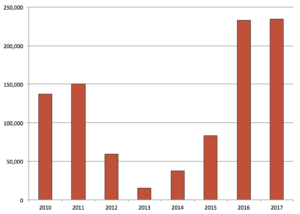Tomorrow is my 1,000th consecutive day of writing!
On one hand it is a holy-cannoli moment. Ten years ago, I never would have dreamed of having this kind of regularity in my writing life. Even before I was depressed, I wrote in fits and spurts and when I felt like it, sneaking in a writing life in between work hours, chores, family functions, and everything else. I could commit during NaNoWriMo, or when I had a deadline, but I was wholly unconcerned about when I would write next or what I was building toward. My writing life was an amorphous thing and even though I had goals (get published!) I had no plan. I was basically an underpants gnome where my plan was:
Phase 1: Write
Phase 2: ????
Phase 3: PUBLISH!
I had this idea that I’d like to write every day, but I didn’t understand what it would do for me and I didn’t have the follow-through to make it happen. When I realized I had written every day the first week of 2016, it was a surprise. I haphazardly decided to keep going, but that cavalier decision hardened into resolve and I slowly figured out how to juggle writing and all my other responsibilities. I learned that I had to prioritize writing to make my writing life happen. I learned that I had to tell friends and family things like, “this has been fun, but I have to go write,” even though I felt silly and trivial doing so the first few times. I learned that writing was as important as my job (because I wanted it to be my job), so I had to value it.
All of those little lessons and small goals helped me to get to the other hand of how I feel about this landmark.
On this other hand, this non-holy-cannoli-moment hand, writing 1,000 days seems inevitable. It’s still an achievement, don’t get me wrong, but I see no reason why I won’t write for 1,000 more days. Daily writing is such a part of my life now that I no longer question how I will shuffle my day to include writing. And that’s the real power that comes from building a writing habit. I have confidence that I will write today and from that confidence stems other confidence:
That this won’t be my last great idea.
That I can figure out how to write this scene.
That I can find the right word.
That I can do this.
While I’m proud of having written 1,000 days in a row, I’m most proud of cultivating confidence in my writing life and developing the kind of consistency that makes me certain that, if I want to, I’ll be celebrating 2,000 days of writing in 2021.
If you’d like to know more about building a daily writing habit, I’ve written previously on why you should write every day and writing while sick. I’ve also written about apps that can make it easier to build a writing habit. If you’re thinking about or trying to build a writing habit, I’d love to hear how it’s going for you.

